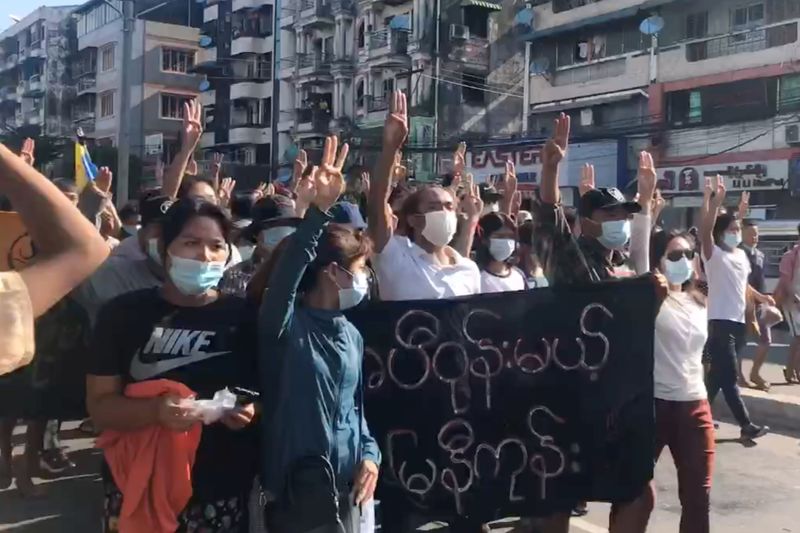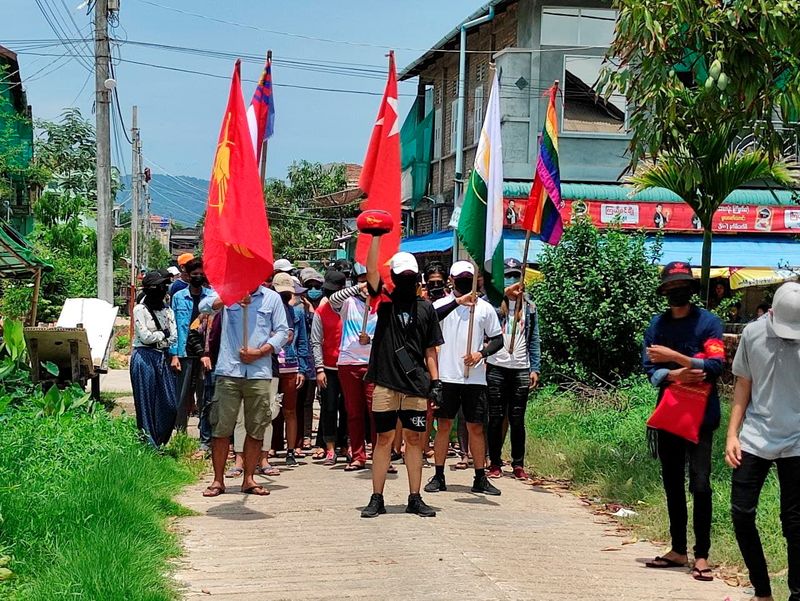(Reuters) -Myanmar security forces opened fire on some of the biggest protests against military rule in days on Sunday killing eight people, media reported, three months after a coup plunged the country into crisis.
The protests, after a spell of dwindling crowds and what appeared to be more restraint by the security forces, were coordinated with demonstrations in Myanmar communities around the world to mark what organisers called "the global Myanmar spring revolution".
"Shake the world with the voice of Myanmar people's unity," the organisers said in a statement.
Streams of demonstrators, some led by Buddhist monks, made their way through cities and towns across the country, including the commercial hub of Yangon and the second city of Mandalay, where two people were shot and killed, the Mizzima news agency reported.
The Irrawaddy news site earlier posted a photograph of a man it said was a security officer in plain clothes taking aim with a rifle in Mandalay.
Three people were killed in the central town of Wetlet, the Myanmar Now news agency said, and two were killed in different towns in Shan State in the northeast, two media outlets reported. One person was also killed in the northern jade-mining town of Hpakant, the Kachin News Group reported.
Reuters could not verify the reports and a spokesman for the ruling junta did not answer calls seeking comment.
The protests are only one of the problems the generals have brought on with their Feb. 1 ouster of the elected government led by Nobel laureate Aung San Suu Kyi.
Wars with ethnic minority insurgents in remote frontier regions in the north and east have intensified significantly since the coup, displacing tens of thousands of civilians, according to United Nations estimates.
In some places civilians with crude weapons have battled security forces, while in central areas military and government facilities that have been secure for generations have been hit by rocket attacks and a wave of small, unexplained blasts.
There have been no claims of responsibility for the explosions.
'HANDMADE BOMBS'
Khit Thit media reported a blast outside a police barracks in Yangon early on Sunday. Vehicles were ablaze it said, but it gave no information on any casualties.
Later, two more blasts went off in the city, with one, outside an administration official's home, wounding one person, the Irrawaddy reported. A news portal in Shan State reported a blast outside the home of a prominent businessman.
The state-run broadcaster in its evening news bulletin on Saturday gave details of at least 11 explosions over the previous 36 hours, mostly in Yangon.
"Some rioters who do not want stability of the state have been throwing and planting handmade bombs at government buildings and on public roads," the broadcaster said.
The Assistance Association for Political Prisoners advocacy group says security forces have killed at least 759 protesters since the coup. Reuters is unable to confirm the toll.
The military, which ruled for almost 50 years until launching a tentative reform process a decade ago, acknowledged in mid-April the death of 248 protesters, saying they were killed after they initiated violence.
The protests and a civil disobedience campaign of strikes have crippled the economy and raised the prospect of 25 million people sliding into poverty, the U.N. Development Programme has warned.

The military said it had to seize power because its complaints of fraud in a November election won by Suu Kyi's party were not addressed by an election commission that deemed the vote fair.
Suu Kyi, 75, has been detained since the coup along with many other members of her party.
